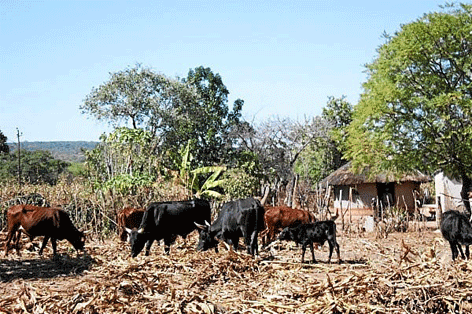
BY MOSES CHIBAYA BUHERA — Villagers are being forced to sell their livestock and households assets for small amounts of money as hunger takes toll amid indications that the government’s grain loan scheme was only catering for a few families. The villagers, who urged government to quickly intervene, said they feared losing all their chickens, goats and cattle which they sell to sustain their families.
Goats and cattle are being sold on average for a paltry US$25 and US$180 respectively.
Kennedy Rusere, a village head under Chief Nyashanu, said he had already sold three of his six goats to enable him to buy food for his family. “We did not harvest anything this previous season,” said Rusere.
“People in this area are now travelling to far away areas, where they buy a bucket of maize for US$3 because it is being sold for US$8 locally.” Rusere said the food shortages had resulted in a serious depletion of livestock in Buhera district.
“It is even worse for me as the village head because desperate people in the area come to me for help,” said Rusere.
“When we receive grain under the (government) grain loan scheme, these are the people that I then target.”
He said the supply of grain from the government was not only inconsistent, but was also not enough to cater for the needy people in his area.
“In my ward, I have 42 families yet I get 12 bags. When I get 12 bags, I then distribute them among the most affected families,” said Rusere.
- Chamisa under fire over US$120K donation
- Mavhunga puts DeMbare into Chibuku quarterfinals
- Pension funds bet on Cabora Bassa oilfields
- Councils defy govt fire tender directive
Keep Reading
“The other problem with the grain loan scheme since its commencement in March, is that it is not being supplied consistently. we have received it three times only.”
World Food Programme (WFP) programme officer, Lijana Jovceva, said over a million people would need food assistance countrywide.
She said she heard reports that families had reduced the numbers of meals they take per day as the food security situation worsens.
“We already hear reports of people who are starting to sell their livestock at distress prices,” she said.
“We also hear of people starting to cut the number of meals they have per day, which is a clear indication that the food security situation is worsening.” Jovceva said erratic rainfall patterns, decrease in acreage, poor agricultural practices and unsuitability of crops grown in certain areas, were some of the major causes of food shortages in Zimbabwe.
‘Food crisis requires long-term solutions’
Jovceva said there was need to find long-term solutions to the food crisis that has bedevilled the country for several years.
“We have been trying to promote what we call community productive asset promotion . . . basically creating assets that can contribute to improve the food security situation in Zimbabwe, for example, rehabilitation of irrigation schemes,” she said.











